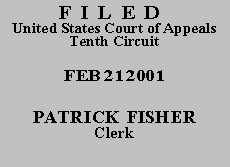

| ROGER EUGENE GRESHAM,
Plaintiff-Appellant, v. JAMES D. CROOK, Defendant-Appellee. |
|
Plaintiff Roger Eugene Gresham, a pro se federal prisoner, appeals the district court's dismissal of his civil rights complaint pursuant to 28 U.S.C. § 1915(e)(2)(B)(ii), and its imposition of a "strike" pursuant to § 1915(g). Because plaintiff's appeal to this court is frivolous, we dismiss the appeal and impose a third "strike" against him pursuant to § 1915(g).
In June 1998, plaintiff filed case No. CIV-98-902-L in the district court, alleging that he fell over a defective railing at the federal prison and received deficient medical care. As part of the Martinez report in that case,(1) paralegal Crook submitted a declaration stating that an administrative remedy retrieval (1) showed that plaintiff had attempted to file an appeal to the central office and was advised that he should first appeal to the institutional and regional levels; and (2) did not show that plaintiff had attempted to follow the administrative remedy process at the institutional or regional levels. R. I, doc. 2, ex. 7. After considering the merits of plaintiff's claims in case No. CIV-98-902-L, the district court dismissed some of the claims and granted summary judgment on the rest. We affirmed the district court's judgment in Gresham v. Flowers, No. 99-6397, 2000 WL 192926 (10th Cir. Feb. 17, 2000) (unpublished disposition), and imposed a "strike" against plaintiff for filing a frivolous appeal. Id. at **4.
Plaintiff brought this action against paralegal Crook, alleging that the statements in the declaration were false and violated plaintiff's civil rights. The magistrate judge to whom the case was referred held that plaintiff failed to state a claim (1) under 42 U.S.C. § 1983 because Crook was not a state actor; and (2) under Bivens v. Six Unknown Named Agents of Fed. Bureau of Narcotics, 403 U.S. 388, 397 (1971), because the statements, even if false, did not affect the outcome of plaintiff's prior lawsuit, which was decided on the merits. The magistrate judge recommended that the complaint be dismissed for failure to state a claim under 28 U.S.C. § 1915(e)(2)(B)(ii), and that a "strike" be imposed against plaintiff pursuant to § 1915(g). The district court adopted these recommendations, and plaintiff appealed.
We review de novo the district court's dismissal of an action for failure to state a claim. Proctor & Gamble Co. v. Haugen, 222 F.3d 1262, 1278 (10th Cir. 2000). Plaintiff argues that his evidence that he did, indeed, file administrative appeals at the institutional and regional levels demonstrates that paralegal Crook committed perjury, thereby violating plaintiff's rights. Plaintiff has not shown that Crook's declaration was false, however, as he has not shown that the administrative remedy retrieval upon which Crook relied contained information other than that reported by Crook. Moreover, even if the declaration contained false information, plaintiff has not shown any violation of his rights as his previous lawsuit was not dismissed for failure to exhaust claims, but was decided on the merits.
Accordingly, we affirm the district court's dismissal of plaintiff's complaint pursuant to § 1915(e)(2)(B)(ii) for failure to state a claim, and its imposition of a strike pursuant to § 1915(g). See Jennings v. Natrona County Detention Ctr. Med. Facility, 175 F.3d 775, 780 (10th Cir. 1999). In addition, we conclude that plaintiff's appeal is frivolous under § 1915(e)(2)(B)(i). The legal theory upon which he chose to proceed is entirely without support, as should have been apparent to him from the district court's rejection of the same argument as frivolous in case No. CIV-98-902-L, the magistrate judge's careful analysis in this case, and the district court's adoption of the magistrate judge's recommendation. We therefore hold that plaintiff has incurred a third strike pursuant to § 1915(g), and that he is now prohibited from proceeding in forma pauperis in a civil action or appeal in federal courtother than petitions for writ of habeas corpusunless the claim involves an "imminent danger of serious physical injury." Id. We remind plaintiff of his continuing obligation to pay all installments of the deferred district court and appellate filing fees until they are paid in full. No exception is made for dismissed appeals. See 28 U.S.C. § 1915(b)(2).
The appeal is DISMISSED as frivolous. The mandate shall issue forthwith.
Entered for the Court
Circuit Judge
*. This order and judgment is not binding precedent, except under the doctrines of law of the case, res judicata, and collateral estoppel. The court generally disfavors the citation of orders and judgments; nevertheless, an order and judgment may be cited under the terms and conditions of 10th Cir. R. 36.3.
1. See Martinez v. Aaron, 570 F.2d 317, 319-20 (10th Cir. 1978).